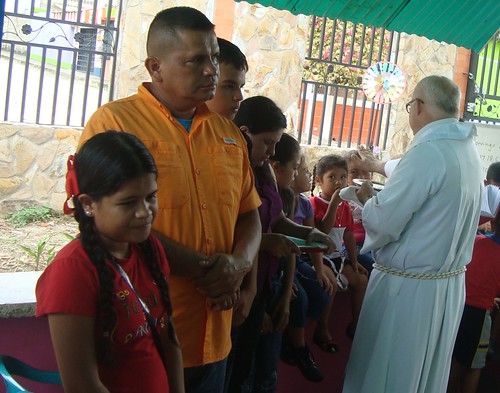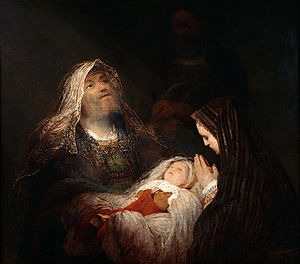 |
| Lent begins on Ash Wednesday. |
For the last three Sundays I have preached about angels. Not entirely by choice, for I follow the lectionary prescribed in the Spanish hymnal, Culto Cristiano, and the Gospel readings for first three Sundays in Lent all mention them, although not necessarily in a good way. Neither did I preach about them necessarily in a good way.
In fact, the Gospel text for the first Sunday in Lent is Matthew 4:1-11, St. Matthew's version of the temptation of Jesus by the Devil. "Then Jesus was led up by the Spirit into the wilderness to be tempted by the devil. And after fasting forty days and forty nights, he was hungry. And the tempter came and said to him, “If you are the Son of God, command these stones to become loaves of bread.” (English Standard Version). The mention of a 40-day fast sets the stage for Lent, which lasts 40 days (minus the six Sundays) from Ash Wednesday to Easter. So do the three references to angels in this passage. When the devil tempts Jesus to throw himself from the pinnacle of the Temple, he says ‘He will command his angels concerning you,’ and "On their hands they will bear you up, lest you strike your foot against a stone." Here the devil quotes Psalm 91: 11-12. (In Venezuela, it is a common belief that leaving a Bible on a table, open to Psalm 91, will prevent evil spirits from entering a house; This really is a superstitious violation of the commandment against taking God's name, or His Word, in vain) When Jesus has withstood all the temptations of the Devil, Matthew 4:11 says, "Then the devil left Him, and behold, angels came and ministered to Him." The third reference, of course, is to the devil himself, a fallen angel.
But I exercised a certain element of choice in that, for my sermon text for March 22, the first Sunday of Lent in 2015, I used as my sermon text the Old Testament lesson, Genesis 22:1-14. This is the story of how the Lord commanded Abraham to sacrifice his only legitmate son, Isaac, the bearer of God's promise in Genesis 15 that Abraham's own son would be his heir and that from this son would come descendants more numerous than the stars in the sky. Abraham was ready to obey this command, but at the last minute, "the Angel of the Lord" bade him stay his hand and sacrifice a ram that gotten caught in a nearby bush. This was my opportunity to point out that a son of Abraham was sacrificed to fulfill that promise in Genesis 22 that through the seed of Abraham all nations of the world would be blessed. This is the double meaning of the words, "God Himself will provide a lamb."
I also noted that this is one of those passages in the Old Testament in which "Angel of the Lord" is a phrase used to describe God Himself. In the New Testament and the Old Testament, two words are both translated as "angel", the word ἄγγελος in Greek and מַלְאָך in Hebrew. Both in their common sense mean "messenger".
In the book of Revelation, the letters to the seven church, dictated by the risen Christ to St. John, all begin with the formula, "Write to the angel of the church in..." In this case, the word ἄγγελος refers to a human being, specifically the pastor of the church. In his office as pastor, he was the messenger of God, who proclaimed the Gospel to his congregation.
There are a number of Old Testament that speak of "the" Angel of the Lord, rather than "an" angel. In all of these cases, the "angel" speaks with the authority of God Himself, rather than a representative of God, and afterward is identified as God by those who experienced the manifestation. "The Angel of the Lord" never appears in this way in any of the books of the New Testament (all of which were written after the birth of Christ), leading many to think that "the Angel of the Lord" was the God the Son, the Second Person of the Trinity, before His incarnation. This adds another dimension to the story of Abraham, Isaac, and the demand for a sacrifice of a son of Abraham.
Of course, I added that there are many passages in both the Old and New Testaments that speak of angels as created beings, more than human and yet less than divine. These are the beings that, as we confess in our liturgy, continually surround the throne of God, always ready to serve Him and sing His praises. Our worship is but an exercise to prepare us for the day when we will join that heavenly chorus. But we are not to worship or pray to these celestial beings, for they cannot do anything that God has not already ordained, or tell us anything that has not been revealed in the Holy Scriptures.
I expanded on this theme the following Sunday, when I did preach on the appointed Gospel reading, Matthew 15: 21-28. This is the story of how Jesus cast a demon out of the daughter of a Canaanite woman. There is more to this story than the story of an exorcism, but I made sure to mention that even as there are holy angels who live to serve God, there are the fallen angels who rebelled against their Creator. Even as the angels of God surround us and seek to protect us, the devil and his angels are always present and seek to first dominate, then destroy us. Stories like that in Matthew 15: 21-28 illustrate that demons are real and demonic possession is a possiblity.
In fact, the Bible tells us that all who have not received the new life in Christ are, to a greater or lesser degree, slaves to sin, and therefore to the devil. In holy baptism, that greatest rite of exorcism, we have the gift of the indwelling of the Holy Spirit and freedom from demonic oppression. Yet we must stay alert to the devil and his wiles and avoid anything that might open a door to demonic influence in our lives, such as any kind of involvement in the occult, even as a game. All who claim contact with "the spirit world" are either simple frauds or worse, in contact with unholy spirits. In any event, they should be avoided.
Finally, on March 8, I preached on Luke 11: 14-28. This passage once again speaks of Jesus casting out a demon, but provides no description of the event. Rather, St. Luke deals with the people's reaction to it. There were those who said that Jesus cast out demons only by the power of the devil himself. But Jesus rebuked them, saying that they made this absurd accusation only because they could not explain away Jesus' power over unclean spirits, but did not want to recognize "the finger of God" in His work. The phrase "finger of God" appears in Exodus 8, when Pharaoh's court magicians admit that they no longer can imitate the signs and wonders that God worked through Moses. Even as the miracles of Moses were signs that God would liberate the Israelites from slavery in Egypt, the casting out of demons and other miracles of Jesus pointed to His ultimate victory over death, sin and the power of the devil.
So we may view Lent not only as a time of reflection and meditation on the sacrifice of Christ, but as our own time of trial. We will be tested by the evil angels, but, by God's grace, His holy angels will minister to us. Amen.



















